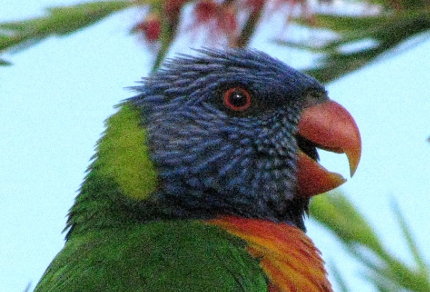Today’s sky was a hodgepodge of sun, cloud, and rain as Vilis and I completed a jumble of tasks before leaving for Melbourne. Our taxi arrived at 5:30 p.m. to ferry us to the airport. Its young driver grooved discretely to country music during the ride and offeried us good wishes for our excursion. “Have a good one,” he told us, and we, having arrived at the airport in plenty of time and with our suitcases weighing less than the 20-kilogram limit for the Tasmania portion of the Jetstar flights, were prepared to do exactly that.
Inside the airport, we learned that our flight to Melbourne was delayed by 3 ½ hours, a situation that caused us to laugh, since we had spent the entire day rushing until that taxi arrived, but were now faced with a span of hours during which there was absolutely nothing we had to do. Vilis happily plugged in his laptop and, with the relaxed focus of the true computer lover, repaired damage to my blog editing site and continued with yet more computer simulations of animal movement patterns. Battling restless hips, I walked the airport aisles while reading Two Centuries of Australian Poetry, edited by Mark O’Connor, which I signed out of the library this morning.
I opened the book at random and first encountered “Rainbow Lorikeets” by the editor, a poem as vivid and boisterous as the birds themselves. Its leaping, tumbling words recreated the lorikeets’ impetuous, high-energy antics, raucous repertoire of conversation, and startling, breath-catching beauty. My eyes then slipped to the poem above O’Connor’s, which was written by Vivian Smith and titled “Tasmania.” How timely, I thought, and drank in brooding images of rangeland painted with cloud shadows, of fading pubs and hills bare of snow.
Having sampled those two entries, I decided to start at the beginning of the collection and work my way through it in its entirety. After all, I had the time. And so, I began with poetic portrayals of the early days of European colonization that mentioned James Cook and Governor Phillip and others in clipped verse so utterly different from the rolling, almost sing-song storytelling style of many of the Aboriginal poets featured in the second of the book’s nineteen sections of poetry. Mary Durack’s “Lament for the Drowned Country” made me yearn for her caught and released fish to deliver her message to her homeland drowned by a dam engineered by white fellas, to tell that land to hold on, that someday it would be dry again. And I felt Robert Walker’s anger at the Aboriginals’ place in Australian society, which he expressed in “Okay, Let’s Be Honest.”
The sections were brief, featuring a handful of poets in each. Landscapes. War. Relationships. Environment. Cities. Sport. Women. Death. And more, not in that order; those simply jump out at me as I write. I read every poem, or at least started every poem, a few so abstract or uninteresting, they could not hold my interest. “You’ll have that book finished soon,” a female security guard told me, smiling, when I paced past her for the twentieth time.
She was right. I did finish it, but within the reading, I became immersed in the voices of Australia until their echoes swirled around me in countless images – giving birth, egrets, footy, the carnage of World War I, shooting the dogs before leaving the farm, the uncertainty of puberty, love compared to the quiet pink and grey elegance of a galah. The images sparked by the words magnified my own perceptions until the airport became a living poem surrounding me – young men curling possessive arms around women wearing high-heeled shoes; fair-haired toddler seated on the floor outside a toilet; weary passengers at Gate 6 with stringy hair and exhausted faces; same fair-haired toddler now asleep, his open-mouthed profile to me, his hair rumpled curves of white gold, his feet dirty and body sturdy. His sister sat nearby, gifting me a faint smile, her bare knees scraped, her Aussie hat on and cell phone game in hand. Another brother’s hair was tousled ginger. Their mother, worn but wearily patient, read books aloud and guided her mob through that unexpected long delay.
The night air brushed warm and sweet over our skin when we finally crossed the tarmac to board the Jetstar A320, ascending metal steps that seemed too steep for our exhaustion.
Reference:
Mark O’Connor, editor. Two Centuries of Australian Poetry, 2nd edition. 1997. Oxford University Press Australia, Melbourne. 308 p.
Poems discussed: “Rainbow Lorikeets” by Mark O’Connor, p. 173; “Tasmania” by Vivian Smith, p. 173; From “Five Visions of Captain Cook” by Kenneth Slessor, p. 5-6; “The Conquest” by Les Murray; “Lament for a Drowned Country” by Jilligan/Mary Durack, p. 17-20; “Okay, Let’s be Honest” by Robert Walker, pp. 23-24; “Induction” by Rebecca Edwards, p.247-248; “Egrets” by Judith Wright, p. 95; “Drop Kick” from “A Kick of the Footy” by Philip Hodgins, pp. 152-153; “Epitaph, World War I” by C.R. Jury, p. 133; “Beach Burial” by Kenneth Slessor, p. 135; “Shooting the Dogs” by Philip Hodgins, pp. 190-191; “Naked Girl and Mirror” by Judith Wright, pp. 240-241; “My Love for Thee is Like a Galah” by Lauren Willians, p. 271.


